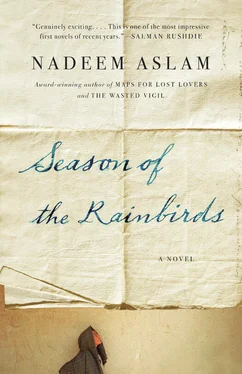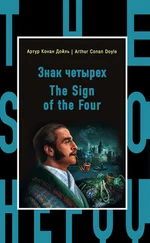The radio was taking a long time to warm up. The barber anxiously consulted his wristwatch. ‘My boy had better do well in his matriculation next June,’ he said. ‘Otherwise he goes straight to Saudi Arabia to work and send me a new radio.’
‘We’ll all have to leave for the Arab countries soon. There won’t be any young men left in the country,’ Zafri said, rearranging the pillow behind his head. ‘Mansoor’s brother is in Kuwait, earning fifteen thousand rupees a month. Mansoor orders meat almost every day now.’
‘The boy was only sixteen when he left. He’s just sent them a television and a camera.’
‘I know.’ Zafri smiled. ‘Maulana Hafeez has been round to see them about it.’
The barber smiled. The radio came on, a ballad faded in. The barber lowered the volume.
‘What annoys me is the way these maulanas never preach to the rich people. They’re always asking us to come to the mosques,’ Zafri said.
The barber settled in the large cuboid chair. He planted his feet against the wall under the shelf where grime deposited originally by customers’ feet was now in the process of being eroded by those same feet; the original colour of the paint showed up, gleaming. He said, ‘They forget the sura which says’ — and he quoted in Arabic — ‘he who amasses riches and scandalously hoards them, thinking his wealth will render him immortal, he shall be flung into the Destroying Flame.’
Zafri waved away a fly and yawned as the barber translated the verses. When the barber finished Zafri said, ‘Look what happened at the post office last night. But neither of those two will talk to Mujeeb Ali about it.’
The barber smiled. ‘But didn’t the postmaster retaliate in style!’
Zafri grinned with relish, slapping his thigh with the flat of his hand. ‘Right under the noses of Mujeeb Ali’s men who were patrolling the streets.’ And he added: ‘I myself would have gone one step further. I would have written some letters myself, one to each person in town, listing the crimes the rich have committed against us since the beginning of time.’ He was beating out the rhythm of the ballad on the bench with his fingernails.
The barber laughed loudly. ‘That would be called the opposition press, and would either be censored or banned altogether. So, my putar, we’d be back where we started.’
The announcer was reading out the names of the people who had requested the ballad just finished.
‘I wonder where they’ve run to,’ Zafri said and asked, ‘Who’s taking care of the post office today?’
The barber was following the new song with his eyes shut; the male singer whistled between lines. ‘Mujeeb Ali has posted two of his goondas outside the door.’
‘I really didn’t think anyone had cause to worry. What could a letter possibly contain? News about Auntie Nasima’s bunions, little Nani’s milk-tooth.’
The barber agreed with a nod of the head, while at the other end his feet kept time to the furious beat of the song. ‘Nothing has happened so far,’ he scoffed, ‘and they have been in people’s possession for ten hours at least.’
A faint layer of crackle developed in the reception. The chirpy song was beginning to disappear behind interference. The barber got up and altered the position of the set a few times until the reception improved, then he reiterated his intentions concerning his son’s future.
Fifteen or so minutes later, when both of them had become absorbed in the broadcast, a car drew up outside. It was a cool blue in colour. On the front door, along the length of its chromium strip, the sun was reflected in two glaring shrapnel points which merged, and then vanished, as the door was opened. The tired-looking man at the wheel got out. The passenger seat was empty but someone was stretched out in the back of the car, dozing. The driver looked about him for a few minutes. His ruffled hair and clothes told of a long journey. A broad triangle of damp pointed along the line of his spine and there were creases behind the knees on the trousers. He walked up to the barber shop and tapped with a fingernail three and a half times on the glass.
‘We’re looking for Yusuf Rao’s house,’ the man said on being invited inside. ‘He’s a lawyer.’
Zafri sat up with an irritated look: the barber was turning down the volume. The newspaper Zafri had been lying on — now corrugated from being pressed into the slats of the bench — drew the stranger’s attention. ‘I see you buy the newspaper I work for,’ he said. There was a pile of newspapers under the bench waiting for Zafri to carry them to his shop.
‘Are you a journalist?’ the barber asked, a little awed.
The stranger shook his head. ‘No. I’m just a photographer.’ He gave his name and pointed through the window at the car and said, ‘ He ’s a journalist.’ The man in the back seat was getting out of the car. His face, too, showed signs of fatigue.
‘We have come to cover the story of the lost letters,’ the photographer said. ‘I believe they’re being delivered on Wednesday.’
Zafri and the barber looked at each other.
The journalist came into the shop. ‘Saif Aziz,’ he introduced himself — with the city-dweller’s characteristic directness — and shook hands with Zafri and the barber. He moved to the centre of the room directly below the ceiling fan, and opened his shirt. From there, his eyes closed, he asked for some water.
The barber had been reaching under the shelf. He pulled out a large thermos flask. The inside, lined with emerald-like glass, contained lozenges of ice and also the barber’s lunch: two mangoes. The fruit was streaked with dried juice which retained the imprint, back to front and upside down, of the newspaper it had been wrapped in.
Saif Aziz drank the iced water deeply. He appeared to revive.
‘Are you friends of his?’ Zafri inquired politely. ‘Yusuf Rao’s?’
Saif Aziz nodded. ‘Since law school,’ he said. ‘I failed my exams and had to do this’ — he wrote with an invisible pen on the palm of his left hand — ‘for a living.’
Both Zafri and the barber nodded. The barber was about to speak when the photographer seemed to notice the radio in the background. ‘Ah,’ he exclaimed, ‘you were listening to Talkeen Shah.’ He walked over to the radio set and turned up the volume.
‘Poor Rukaya is dead,’ Saif Aziz said. Rukaya was Talkeen Shah’s secret love, the woman he longed for.
The barber looked up. ‘No, no . She has gone to live in England. She is not dead.’
Saif Aziz’s face was beginning to lose its red glow. He ran his fingers through his hair. ‘The actress who was the voice of Rukaya has died,’ he explained. ‘So the scriptwriters were forced to send her abroad.’
Both Zafri and the barber wore baffled expressions. ‘Dead?’ Zafri said in a low voice. ‘But she writes regularly. Talkeen Shah waits for her letters. He fights with the postman whenever a letter is overdue.’
Saif Aziz and the photographer seemed amused by this confusion. The photographer shrugged.
Then the barber stood up. ‘There is something you should know about those lost letters.’
But Saif Aziz waved him down. ‘I know about the judge’s murder,’ he said. ‘Ours was the only newspaper that ran the story.’ And he added in mock disappointment: ‘Don’t tell me you didn’t see it?’
‘We did see it,’ Zafri said. ‘But there’s something else you should know.’
And the barber cleared his throat noisily before beginning.

Azhar’s favourite dish was a kind of soup made by boiling for eight to ten hours sheep’s hooves and shinbones. The cuticle of the hooves and the hairs on the skin were first singed over naked flame and scraped off. Then the hide was scored and the cuts were spiced. As the soup simmered, gelatin from the tendons was slowly released through the pores. The dish was served with opaque globules of gelatin and small pieces of bones like knotted branches floating on the surface, and was eaten with tandoori bread. Halfway through the meal Azhar would test how successful the soup was by pressing the tips of his fingers together. If the fingers stuck he would proclaim the dish a triumph: the soup had simmered long enough to allow the right amount of gelatin and marrow to ooze out of the bones.
Читать дальше













